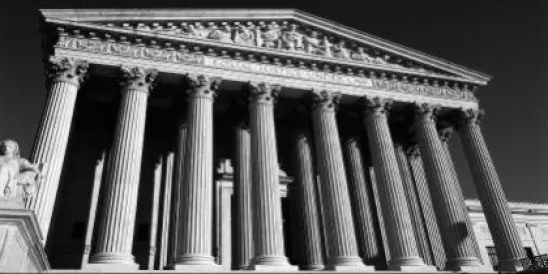The U.S. Supreme Court ruled July 9, 2020, in McGirt v. Oklahoma that the reservation established for the Creek Nation under 19th century treaties survives today, and, despite Oklahoma’s century-long assertion of criminal jurisdiction, McGirt, a member of the Creek Nation, could be tried for his criminal offenses only by the federal government under the Major Crimes Act.
In an opinion authored by Justice Gorsuch and joined by Justices Ginsburg, Breyer, Sotomayor and Kagan, the Court, citing the well-established standards of Solem v. Bartlett and its progeny, held that the Creek Nation Reservation, once established, presumptively persisted and that, notwithstanding allotment of the reservation and multiple acts that reduced the authority of the Creek Nation government, Congress had failed to express a clear intent to diminish or disestablish the reservation:
Missing in all this, however, is a statute evincing anything like the “present and total surrender of all tribal interests” in the affected lands. Without doubt, in 1832 the Creek “cede[d]” their original homelands east of the Mississippi for a reservation promised in what is now Oklahoma.1832 Treaty, Art. I, 7 Stat. 366. And in 1866, they “cede[d] and convey[ed]” a portion of that reservation to the United States. Treaty With the Creek, Art. III, 14 Stat. 786. But because there exists no equivalent law terminating what remained, the Creek Reservation survived allotment.
For years, States have sought to suggest that allotments automatically ended reservations, and for years courts have rejected the argument. Remember, Congress has defined “Indian country” to include “all land within the limits of any Indian reservation . . . notwithstanding the issuance of any patent, and, including any rights-of-way running through the reservation.” 18 U.S.C. §1151(a). So the relevant statute expressly contemplates private land ownership within reservation boundaries. Nor under the statute’s terms does it matter whether these individual parcels have passed hands to non-Indians. To the contrary, this Court has explained repeatedly that Congress does not disestablish a reservation simply by allowing the transfer of individual plots, whether to Native Americans or others. See Mattz, 412 U. S., at 497 (“[A]llotment under the . . . Act is completely consistent with continued reservation status”);
...
The federal government issued its own land patents to many homesteaders throughout the West. These patents transferred legal title and are the basis for much of the private land ownership in a number of States today. But no one thinks any of this diminished the United States’s claim to sovereignty over any land. To accomplish that would require an act of cession, the transfer of a sovereign claim from one nation to another. 3 E. Washburn, American Law of Real Property *521–*524. And there is no reason why Congress cannot reserve land for tribes in much the same way, allowing them to continue to exercise governmental functions over land even if they no longer own it communally. Indeed, such an arrangement seems to be contemplated by §1151(a)’s plain terms. Cf. Seymour, 368 U. S., at 357–358.3
While McGirt relates to criminal jurisdiction, the Indian country jurisdictional implications are broad and important. Tribes will find Justice Gorsuch’s reference to tribes “continu[ing] to exercise governmental functions over land even if they no longer own it communally” helpful in responding to attempted regulatory incursions by state and municipal governments.



 />i
/>i

